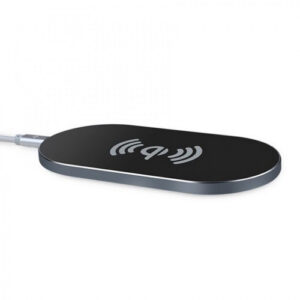-
-
Mobile Charger, wireless charger
A522 Wireless Charger with Fast Charging
4.83 out of 5৳ 1,150৳ 690 -
wireless charger, Car Charger, Fast Charging mobile Charger, Mobile Charger
A523 Wireless Car Holder With Micro USB Cable
4.86 out of 5৳ 1,400৳ 1,365
The way we power our gadgets has been revolutionized by wireless charging technology. You can charge your devices more easily and without the hassle of tangled wires because it does away with the need for cables. Due to the growing acceptance of wireless charging, a broad range of wireless chargers are now available on the market to suit a range of requirements and price points.
How Do Wireless Chargers Work
An electromagnetic field is used by wireless chargers to transmit power from the battery to your device. A coil inside the battery transforms the alternating current it produces into a magnetic field. A second circuit inside your device is then stimulated by this magnetic field to produce an electrical current, which is then used to recharge your battery.
Types of Wireless Chargers There are three types of wireless chargers:
A4WP, Qi, and PMA. PMA and A4WP are less common wireless charging standards than Qi, which is the most well-liked and commonly used one. Most gadgets that allow wireless charging, such as smartphones, smartwatches, and earbuds, are compatible with Qi chargers.
Benefits of Wireless Chargers
Convenience is one of the primary advantages of wireless chargers. You don’t have to stress about locating the proper cable or plugging it in correctly when using wireless charging. Simply set your gadget on the charger, and it will begin to charge immediately. Wireless chargers also clear up mess and order your workspace.
Features to Look for in a Wireless Charger
There are a number of characteristics to think about when selecting a wireless charger. These include compatibility, design, longevity, and charging speed. Additional benefits on some chargers include LED lighting, anti-slip pads, and automatic shut-off.
Wireless Chargers for Different Devices
For a variety of gadgets, including earbuds, smartwatches, and cellphones, there are numerous wireless chargers accessible. While some chargers are more specialized and can only charge one type of gadget at a time, others are more versatile.
Wireless Chargers for Cars
You can charge your devices while on the go with the help of wireless car chargers that are also accessible. These chargers can be used to charge your devices through the USB port or cigarette lighter in your vehicle. They are usually made to fit into the cup holder or air vent.
Wireless Chargers for Travel
Since they do away with the need for numerous cords and adapters, wireless chargers are perfect for travel. Some wireless chargers are portable and specially made for use while traveling. You can carry these chargers wherever you go by simply tossing them in your luggage.
Wireless Charging Safety Tips
Although wireless charging is generally secure, there are some safety measures you should consider. These include keeping the charger out of the reach of kids and dogs, charging your device only when necessary, and avoiding overcharging or using a damaged charger.
Conclusion
Without the hassle of cables, wireless charging is a useful and practical way to power up your devices. Finding a wireless charger that meets your requirements and your budget is now simpler than ever thanks to their rising popularity. You can select the best wireless adapter for your devices by taking into account the features, compatibility, and safety advice.
FAQs:
Q: Do all smartphones support wireless charging?
A: No, not all smartphones support wireless charging. Only devices with a built-in wireless charging receiver can be charged wirelessly.
Q: Can wireless chargers charge multiple devices at once?
A: Some wireless chargers are designed to charge multiple devices at once, but not all of them have this feature. Be sure to check the specifications of the charger before purchasing.
Q: Can wireless chargers overheat or damage my device?
A: Wireless chargers are designed to prevent overheating and damage to your device. However, it’s important to use a charger that is compatible with your device and to follow the manufacturer’s instructions to avoid any potential issues.
Q: Can I use a wireless charger with a phone case?
A: Yes, you can use a wireless charger with a phone case, but it’s important to make sure that the case is compatible with wireless charging. Some cases may be too thick or have metal components that can interfere with the charging process.
Q: How long does it take to fully charge a device using a wireless charger?
A: The charging time for a device using a wireless charger varies depending on the charger’s output power and the device’s battery capacity. In general, wireless charging may take slightly longer than wired charging, but it is a more convenient option.
Q: Can I use a wireless charger with my laptop?
A: No, laptops are not compatible with wireless charging technology at this time.
Q: Can I charge my device wirelessly while it is in use?
A: Yes, you can charge your device wirelessly while it is in use, but it may charge more slowly than if it were not in use.
Q: Are wireless chargers more expensive than traditional chargers?
A: Wireless chargers can be more expensive than traditional chargers, but the cost varies depending on the charger’s features and brand.
Q: Can I use a wireless charger with my older smartphone?
A: If your older smartphone does not have a built-in wireless charging receiver, you will not be able to use a wireless charger to charge it. However, you may be able to purchase a wireless charging adapter that can be attached to your phone’s charging port.
Q: Are there any environmental benefits to using a wireless charger?
A: Using a wireless charger eliminates the need for multiple cables and adapters, which can help reduce electronic waste. Additionally, some wireless chargers are designed with eco-friendly materials and packaging.




